外研版英语八年级下 册Module 5 Cartoon stories Unit 3 Language in use课件(共34张PPT)
文档属性
| 名称 | 外研版英语八年级下 册Module 5 Cartoon stories Unit 3 Language in use课件(共34张PPT) | 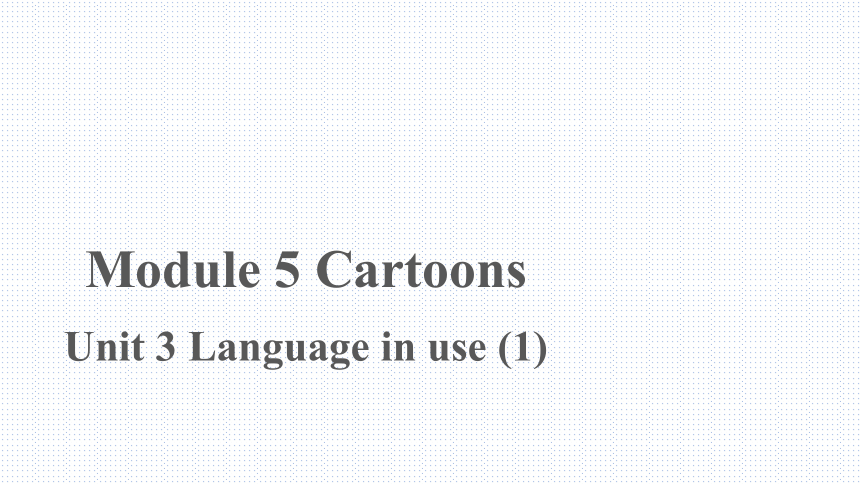 | |
| 格式 | zip | ||
| 文件大小 | 2.0MB | ||
| 资源类型 | 教案 | ||
| 版本资源 | 外研版 | ||
| 科目 | 英语 | ||
| 更新时间 | 2020-04-28 12:42:59 | ||
图片预览

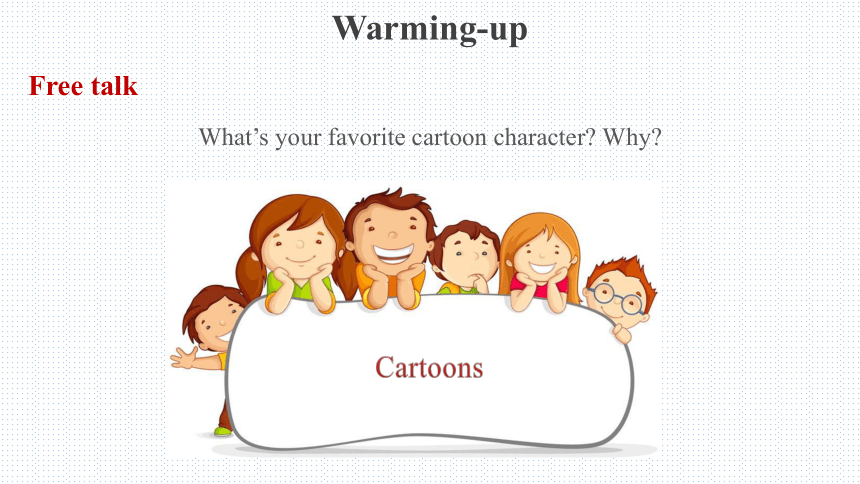
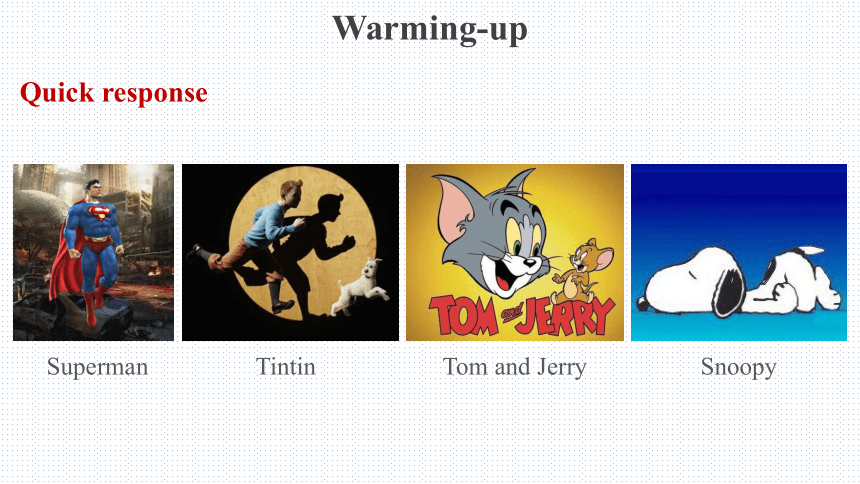
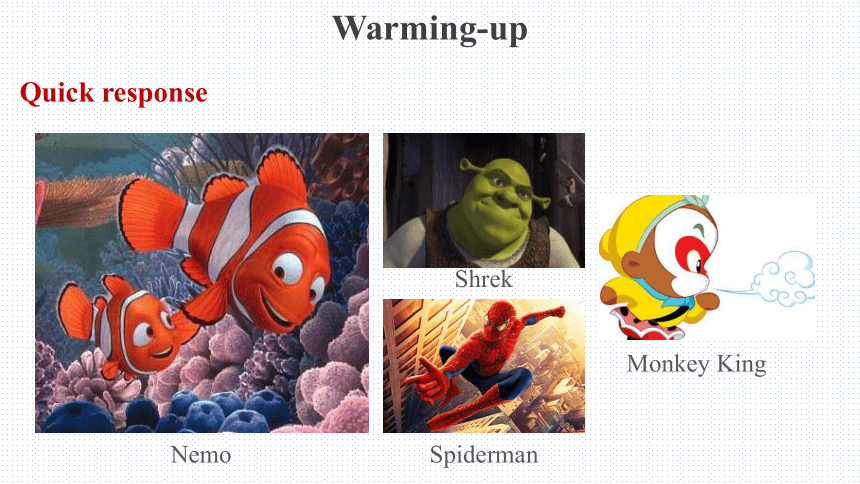
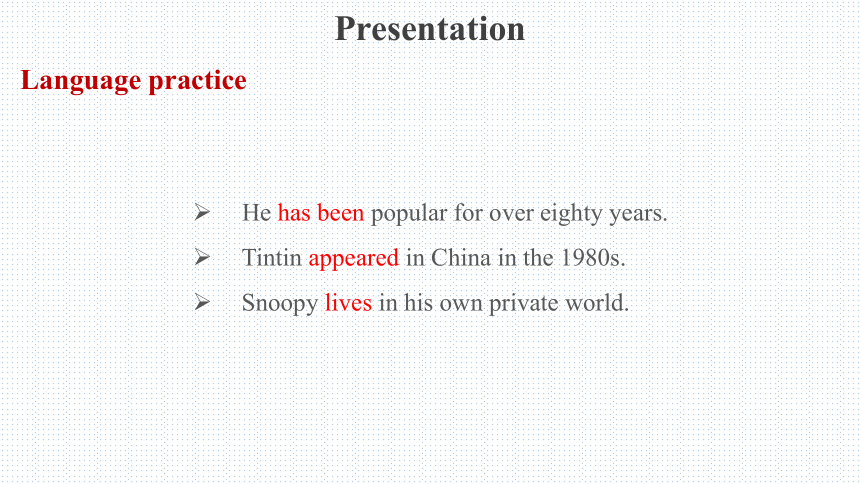
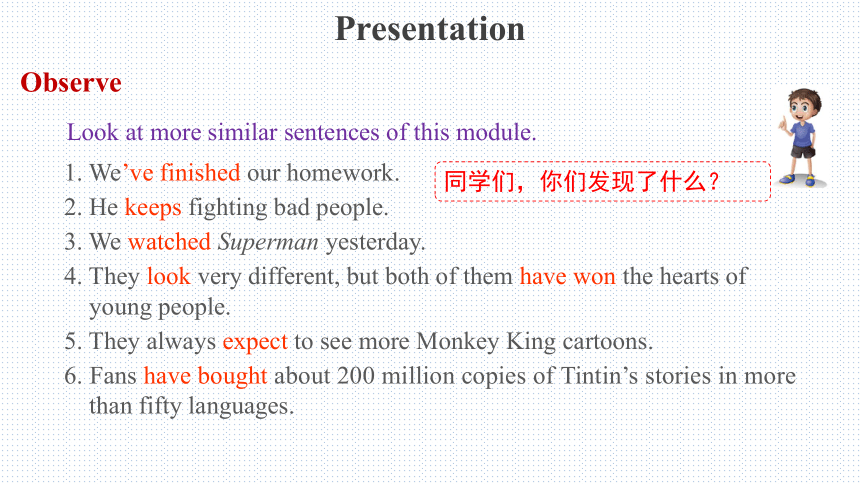
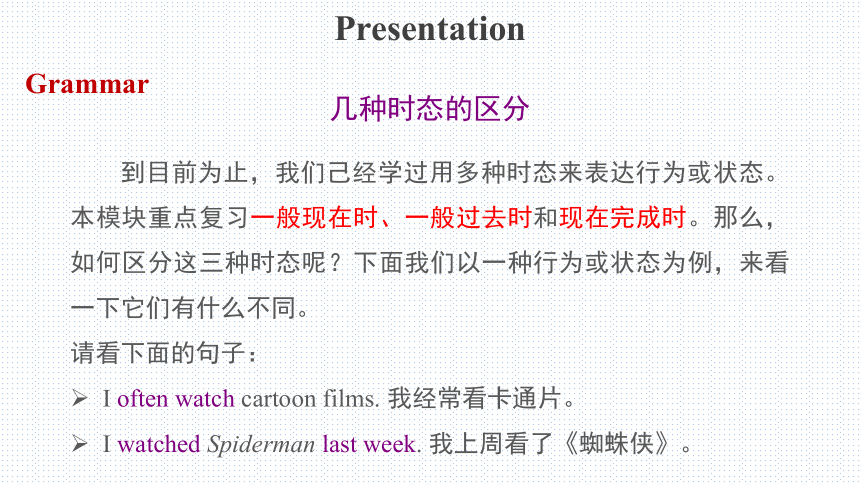
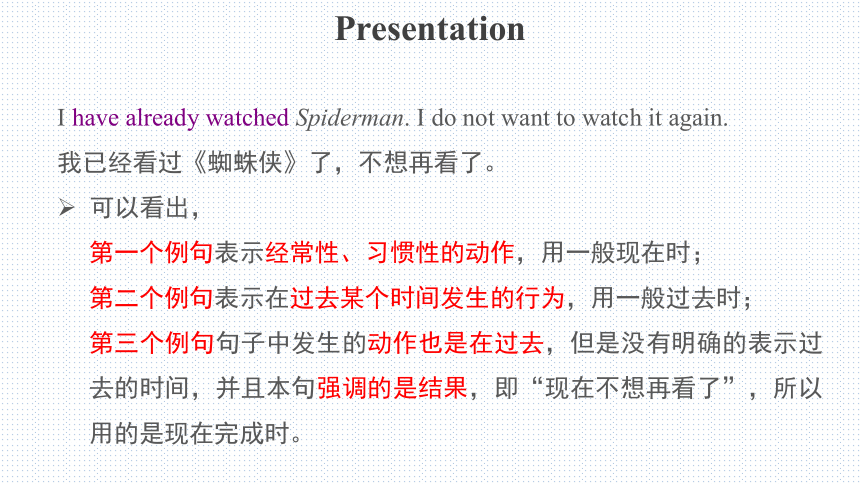
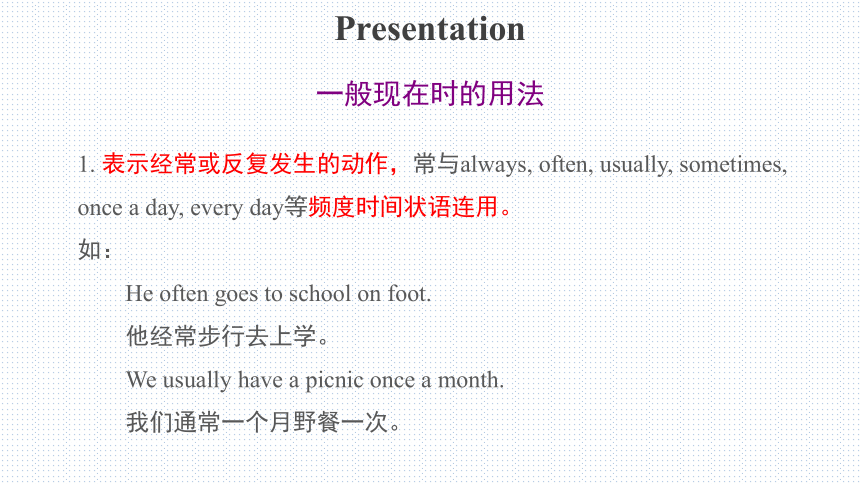
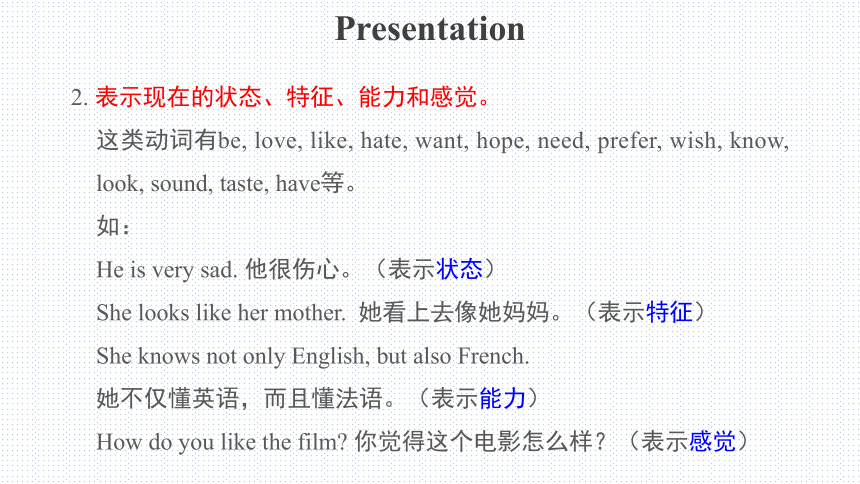
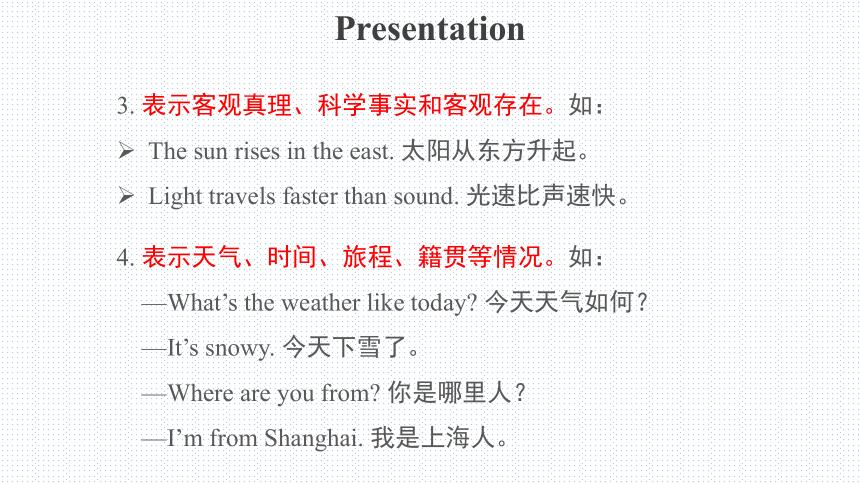
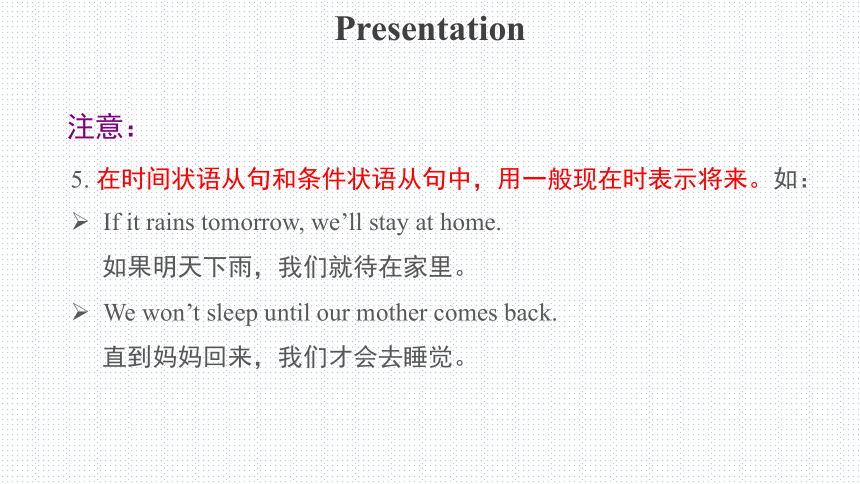
文档简介
课件34张PPT。Unit 3 Language in use (1)Module 5 CartoonsWhat’s your favorite cartoon character? Why?Free talkWarming-upQuick responseSupermanTintinTom and JerrySnoopyWarming-upNemoShrekSpidermanMonkey KingWarming-upQuick response He has been popular for over eighty years.
Tintin appeared in China in the 1980s.
Snoopy lives in his own private world.Language practicePresentationLook at more similar sentences of this module.1. We’ve finished our homework.
2. He keeps fighting bad people.
3. We watched Superman yesterday.
4. They look very different, but both of them have won the hearts of young people.
5. They always expect to see more Monkey King cartoons.
6. Fans have bought about 200 million copies of Tintin’s stories in more than fifty languages.同学们,你们发现了什么?ObservePresentation几种时态的区分 到目前为止,我们己经学过用多种时态来表达行为或状态。本模块重点复习一般现在时、一般过去时和现在完成时。那么,如何区分这三种时态呢?下面我们以一种行为或状态为例,来看一下它们有什么不同。
请看下面的句子:
I often watch cartoon films. 我经常看卡通片。
I watched Spiderman last week. 我上周看了《蜘蛛侠》。GrammarPresentationI have already watched Spiderman. I do not want to watch it again.
我已经看过《蜘蛛侠》了,不想再看了。
可以看出,
第一个例句表示经常性、习惯性的动作,用一般现在时;
第二个例句表示在过去某个时间发生的行为,用一般过去时;
第三个例句句子中发生的动作也是在过去,但是没有明确的表示过去的时间,并且本句强调的是结果,即“现在不想再看了”,所以用的是现在完成时。Presentation1. 表示经常或反复发生的动作,常与always, often, usually, sometimes, once a day, every day等频度时间状语连用。
如:
He often goes to school on foot.
他经常步行去上学。
We usually have a picnic once a month.
我们通常一个月野餐一次。一般现在时的用法Presentation2. 表示现在的状态、特征、能力和感觉。
这类动词有be, love, like, hate, want, hope, need, prefer, wish, know, look, sound, taste, have等。
如:
He is very sad. 他很伤心。(表示状态)
She looks like her mother. 她看上去像她妈妈。(表示特征)
She knows not only English, but also French.
她不仅懂英语,而且懂法语。(表示能力)
How do you like the film? 你觉得这个电影怎么样?(表示感觉)Presentation3. 表示客观真理、科学事实和客观存在。如:
The sun rises in the east. 太阳从东方升起。
Light travels faster than sound. 光速比声速快。
4. 表示天气、时间、旅程、籍贯等情况。如:
—What’s the weather like today? 今天天气如何?
—It’s snowy. 今天下雪了。
—Where are you from? 你是哪里人?
—I’m from Shanghai. 我是上海人。Presentation5. 在时间状语从句和条件状语从句中,用一般现在时表示将来。如:
If it rains tomorrow, we’ll stay at home.
如果明天下雨,我们就待在家里。
We won’t sleep until our mother comes back.
直到妈妈回来,我们才会去睡觉。注意:Presentation6. 表示已决定或计划要做的事,或按自然规律会发生的事。
常用于这类情况的动词有come, go, start, begin, leave, return, arrive, stop, close等,此时用一般现在时表示将来。如:
He leaves for America next week. 他下周动身去美国。
When does the train arrive? 火车几点到?
Tomorrow is Monday. 明天是星期一。Presentation一般过去时的用法 表示过去某一时间发生的动作或存在的状态,常与表示过去的时间状语连用,如 yesterday, last year/month/week, three hours ago, two years ago等。如:
I graduated from the university last year. 去年我大学毕业。
We enjoyed ourselves yesterday. 我们昨天玩得很高兴。
I finished my homework just now. 我刚刚写完了作业。Presentation2. 表示过去经常或反复发生的动作,常和often, always等表示频度的时间状语连用。如:
Sam often went to work by bike last year. 去年萨姆常常骑自行车去上班。
My mother used to get up early. 我母亲过去常常早起。3. 有时动作发生的时间不是很清楚,但确实是过去发生的,应当用一般过去时。如:
Who broke the cup? 谁打碎了杯子?
Hi, Linda! I didn’t know you were here. 嗨,琳达!我不知道你在这儿。Presentation1. 强调过去的动作对现在的影响,往往具有因果关系,常与already, yet等副词 连用。如:
She has already bought a car. 她已经买了一辆车。
He has not found his book yet. 他还没有找到他的书。
They have gone to Shanghai. 他们已经去了上海。现在完成时的用法Presentation2. 表示过去某一动作一直持续至今,常与for, since等引导的时间状语连用。如:
I have been in England for five years. 我已经在英格兰待了五年了。
He has lived here since he moved here. 从他搬到这儿以来就一直住在这里。
3. 表示经历或经验,常与ever, never, once, twice, before等副词连用。如:
—Have you ever been to Shanghai? 你去过上海吗?
—I have been there twice. 我去过那里两次了。Presentation1. 现在完成时和一般过去时都表示在过去完成的动作。但现在完成时强调这一动作与现在的关系,如对现在产生的结果或影响等,而一般过去时只表示动作在过去某一时刻发生,不表示和现在的关系。
试比较:
a.?I?have?lost?my?new bike.??
我把新自行车弄丢了。(现在还未找到)??
b.?I?lost?my?new?bike yesterday.??我昨天把新自行车弄丢了。
(昨天丢的,现在找到与否没说明。)现在完成时与一般过去时的区别:Presentation2. 侧重点不同。现在完成时侧重于现在的结果,而一般过去时侧重于动作发生的时间。?
a.?I?have?seen?the?film. 我看过这部电影。
(现在我仍记得电影的内容)?
I?saw?the?film?three?days?ago. 三天前我看了这部电影。
? (强调是三天前,而不是别的时候看的电影)
b. He?has?been?in?the?League?for?three?years.??
他入团已经三年了。?
Tom?wrote?a?letter?to?his?parents?last?night.?
昨晚汤姆给他的父母写了封信。Presentation3.?两种时态的区分?
(1) 一般过去时的谓语动词用过去式,而现在完成时的谓语基本构成是“助动词 have/has+过去分词”。
(2)?时间状语不同。一般过去时常与yesterday, just?now, in?2002, “段时间+ago”或“since+过去时间+ago” 等表示过去时间的状语连用;
而现在完成时则常与just, already, yet, ever, never before等副词以及和these?days, this?week,“for + 段时间”,“since+过去时间/从句” 等时间状语连用。 PresentationGrammar Exercises.1. David is a tennis player. He ______ to play tennis when he was six years old. (2018?北京)
A. begins B. will begin C. has begun D. began
2. —Jerry, have you ever been to the Great Wall?(2018?天津)
—Yes. I ______ there with my parents last year.
A. go B. went C. will go D. have gone
3. —Do you still play basketball?(2018?湖北武汉)
—Oh, no. I_____ it for the past two years.
A. haven’t played B. didn’t play C. won’t play D. hadn’t played一般过去时和现在完成时CBAPracticeDaming: Hi, Tony. What are you reading?
Tony: The Adventures of Tintin. It’s fantastic.
(1) _________ you __________ (ever read) a Tintin book?
Daming: No, I (2) _______________ (never read) a Tintin story.
(3) _________ (be) they popular?
Tony: Yes, they (4) ___________ (be) popular for more than eighty years.
The first Tintin story (5) __________ (appear) in 1929.Have ever readhave never readArehave beenappearedComplete the conversation.PracticeDaming: What does Tintin do?
Tony: He (6) _______ (work) for a newspaper and he (7) ______ (have)
lots of exciting experiences.
Daming: And (8) ______ the stories ______ (have) happy endings?
Tony: Oh, yes, they always do.
Daming: Sounds great! Do you mind if I borrow your book?workshasdohavePracticeWhen I was young, I (1) ____________ (not like) green vegetables. The only vegetable I (2) __________ (eat) was potatoes. I was quite small and not very strong, so I was not very good at sport. Then when I (3) _______________ (watch) television one day I saw the cartoon Popeye. didn’t likeatewas watchingComplete the passage.Practice When Popeye stands next to the bad man, Bluto, he (4) ________ (look) small and weak, and when they fight, he always (5) ________ (lose). Then he eats some green vegetables. His arms (6) ________ (grow) thicker. He becomes stronger and he wins his fights. The next day I was going to play football at school, so I asked my mother for some green vegetables. I (7) ________ (score) three times and we won the match! I (8) ______________ (love) green vegetables ever since. lookslosesgrowscoredhave lovedPractice Many people love cartoons because they are great fun. Parents and children (1) ________ together as the Monkey King makes a terrible (2) ________ or Shrek, the (3) _______ green animal, sing a song. Cartoon heroes often live in a(n) (4) _______ world of their (5) _______. Artists (6) _______ good cartoon heroes as well as bad people. The heroes always win, and their stories (7) ________ us and help us feel safe.uglymesslaughcreate laugh mess own private satisfy uglyownprivatecreatesatisfyPracticeWork in pairs and number the pictures in the correct order.Now listen and check.4231PracticeListen again and answer the questions.1. Why does Betty not think the cartoon is funny at first?
2. Why does Tony think the cartoon is really clever?Because she does not understand it at first.Because the policeman could catch the man in the lift, but he doesn’t. They both just stand there, waiting for the lift to stop!Practice1. Food easily ______ bad in hot weather.
A. goes B. go C. went D. goes to
解析:表示科学事实时用一般现在时。go bad是固定词组,意为“变质,变坏”。A2. —I wish your sister would come to visit me.
—I’ll tell her when I ______ her.
A. see B. saw C. will see D. am seeing
解析:在时间状语从句和条件状语从句中,用一般现在时表示将来。AConsolidationExercise一、单项选择。3. —He has already gone to England.
—When ____ he _____ there?
A. will; go B. is; going C. did; go D. has; gone
解析:由上下文可知,下句应问“他何时去的?”,用一般过去时。CConsolidation4. The last half of nineteenth century _____ the steady improvement in the
means of travel.
A. has witnessed B. was witnessed
C. is witnessed D. witnessed
解析:由 the last half of nineteenth century可知,应用一般过去时。D5. There ______ a lot of changes here since 1980.
A. have been B. have had C. will be D. are
解析:由时间状语since 1980可知,此句应用there be的现在完成时。
6. It _____ every day so far this week.
A. rains B. has rained C. had rained D. will rain
解析:so far“到目前为止”,与现在完成时连用。ABConsolidationSummaryI have already watched Spiderman. I do not want to watch it again. 我已经看过《蜘蛛侠》了,不想再看了。可以看出:
第一个例句表示经常性、习惯性的动作,用一般现在时;
第二个例句表示在过去某个时间发生的行为,用一般过去时;
第三个例句句子中发生的动作也是在过去,但是没有明确的表示过去的时间,并且本句强调的是结果,即“现在不想再看了”,所以用的是现在完成时。1. Revise and recite the new words and expressions of Module 5.
2. Revise the grammar of Module 5. HomeworkGoodbye!
Tintin appeared in China in the 1980s.
Snoopy lives in his own private world.Language practicePresentationLook at more similar sentences of this module.1. We’ve finished our homework.
2. He keeps fighting bad people.
3. We watched Superman yesterday.
4. They look very different, but both of them have won the hearts of young people.
5. They always expect to see more Monkey King cartoons.
6. Fans have bought about 200 million copies of Tintin’s stories in more than fifty languages.同学们,你们发现了什么?ObservePresentation几种时态的区分 到目前为止,我们己经学过用多种时态来表达行为或状态。本模块重点复习一般现在时、一般过去时和现在完成时。那么,如何区分这三种时态呢?下面我们以一种行为或状态为例,来看一下它们有什么不同。
请看下面的句子:
I often watch cartoon films. 我经常看卡通片。
I watched Spiderman last week. 我上周看了《蜘蛛侠》。GrammarPresentationI have already watched Spiderman. I do not want to watch it again.
我已经看过《蜘蛛侠》了,不想再看了。
可以看出,
第一个例句表示经常性、习惯性的动作,用一般现在时;
第二个例句表示在过去某个时间发生的行为,用一般过去时;
第三个例句句子中发生的动作也是在过去,但是没有明确的表示过去的时间,并且本句强调的是结果,即“现在不想再看了”,所以用的是现在完成时。Presentation1. 表示经常或反复发生的动作,常与always, often, usually, sometimes, once a day, every day等频度时间状语连用。
如:
He often goes to school on foot.
他经常步行去上学。
We usually have a picnic once a month.
我们通常一个月野餐一次。一般现在时的用法Presentation2. 表示现在的状态、特征、能力和感觉。
这类动词有be, love, like, hate, want, hope, need, prefer, wish, know, look, sound, taste, have等。
如:
He is very sad. 他很伤心。(表示状态)
She looks like her mother. 她看上去像她妈妈。(表示特征)
She knows not only English, but also French.
她不仅懂英语,而且懂法语。(表示能力)
How do you like the film? 你觉得这个电影怎么样?(表示感觉)Presentation3. 表示客观真理、科学事实和客观存在。如:
The sun rises in the east. 太阳从东方升起。
Light travels faster than sound. 光速比声速快。
4. 表示天气、时间、旅程、籍贯等情况。如:
—What’s the weather like today? 今天天气如何?
—It’s snowy. 今天下雪了。
—Where are you from? 你是哪里人?
—I’m from Shanghai. 我是上海人。Presentation5. 在时间状语从句和条件状语从句中,用一般现在时表示将来。如:
If it rains tomorrow, we’ll stay at home.
如果明天下雨,我们就待在家里。
We won’t sleep until our mother comes back.
直到妈妈回来,我们才会去睡觉。注意:Presentation6. 表示已决定或计划要做的事,或按自然规律会发生的事。
常用于这类情况的动词有come, go, start, begin, leave, return, arrive, stop, close等,此时用一般现在时表示将来。如:
He leaves for America next week. 他下周动身去美国。
When does the train arrive? 火车几点到?
Tomorrow is Monday. 明天是星期一。Presentation一般过去时的用法 表示过去某一时间发生的动作或存在的状态,常与表示过去的时间状语连用,如 yesterday, last year/month/week, three hours ago, two years ago等。如:
I graduated from the university last year. 去年我大学毕业。
We enjoyed ourselves yesterday. 我们昨天玩得很高兴。
I finished my homework just now. 我刚刚写完了作业。Presentation2. 表示过去经常或反复发生的动作,常和often, always等表示频度的时间状语连用。如:
Sam often went to work by bike last year. 去年萨姆常常骑自行车去上班。
My mother used to get up early. 我母亲过去常常早起。3. 有时动作发生的时间不是很清楚,但确实是过去发生的,应当用一般过去时。如:
Who broke the cup? 谁打碎了杯子?
Hi, Linda! I didn’t know you were here. 嗨,琳达!我不知道你在这儿。Presentation1. 强调过去的动作对现在的影响,往往具有因果关系,常与already, yet等副词 连用。如:
She has already bought a car. 她已经买了一辆车。
He has not found his book yet. 他还没有找到他的书。
They have gone to Shanghai. 他们已经去了上海。现在完成时的用法Presentation2. 表示过去某一动作一直持续至今,常与for, since等引导的时间状语连用。如:
I have been in England for five years. 我已经在英格兰待了五年了。
He has lived here since he moved here. 从他搬到这儿以来就一直住在这里。
3. 表示经历或经验,常与ever, never, once, twice, before等副词连用。如:
—Have you ever been to Shanghai? 你去过上海吗?
—I have been there twice. 我去过那里两次了。Presentation1. 现在完成时和一般过去时都表示在过去完成的动作。但现在完成时强调这一动作与现在的关系,如对现在产生的结果或影响等,而一般过去时只表示动作在过去某一时刻发生,不表示和现在的关系。
试比较:
a.?I?have?lost?my?new bike.??
我把新自行车弄丢了。(现在还未找到)??
b.?I?lost?my?new?bike yesterday.??我昨天把新自行车弄丢了。
(昨天丢的,现在找到与否没说明。)现在完成时与一般过去时的区别:Presentation2. 侧重点不同。现在完成时侧重于现在的结果,而一般过去时侧重于动作发生的时间。?
a.?I?have?seen?the?film. 我看过这部电影。
(现在我仍记得电影的内容)?
I?saw?the?film?three?days?ago. 三天前我看了这部电影。
? (强调是三天前,而不是别的时候看的电影)
b. He?has?been?in?the?League?for?three?years.??
他入团已经三年了。?
Tom?wrote?a?letter?to?his?parents?last?night.?
昨晚汤姆给他的父母写了封信。Presentation3.?两种时态的区分?
(1) 一般过去时的谓语动词用过去式,而现在完成时的谓语基本构成是“助动词 have/has+过去分词”。
(2)?时间状语不同。一般过去时常与yesterday, just?now, in?2002, “段时间+ago”或“since+过去时间+ago” 等表示过去时间的状语连用;
而现在完成时则常与just, already, yet, ever, never before等副词以及和these?days, this?week,“for + 段时间”,“since+过去时间/从句” 等时间状语连用。 PresentationGrammar Exercises.1. David is a tennis player. He ______ to play tennis when he was six years old. (2018?北京)
A. begins B. will begin C. has begun D. began
2. —Jerry, have you ever been to the Great Wall?(2018?天津)
—Yes. I ______ there with my parents last year.
A. go B. went C. will go D. have gone
3. —Do you still play basketball?(2018?湖北武汉)
—Oh, no. I_____ it for the past two years.
A. haven’t played B. didn’t play C. won’t play D. hadn’t played一般过去时和现在完成时CBAPracticeDaming: Hi, Tony. What are you reading?
Tony: The Adventures of Tintin. It’s fantastic.
(1) _________ you __________ (ever read) a Tintin book?
Daming: No, I (2) _______________ (never read) a Tintin story.
(3) _________ (be) they popular?
Tony: Yes, they (4) ___________ (be) popular for more than eighty years.
The first Tintin story (5) __________ (appear) in 1929.Have ever readhave never readArehave beenappearedComplete the conversation.PracticeDaming: What does Tintin do?
Tony: He (6) _______ (work) for a newspaper and he (7) ______ (have)
lots of exciting experiences.
Daming: And (8) ______ the stories ______ (have) happy endings?
Tony: Oh, yes, they always do.
Daming: Sounds great! Do you mind if I borrow your book?workshasdohavePracticeWhen I was young, I (1) ____________ (not like) green vegetables. The only vegetable I (2) __________ (eat) was potatoes. I was quite small and not very strong, so I was not very good at sport. Then when I (3) _______________ (watch) television one day I saw the cartoon Popeye. didn’t likeatewas watchingComplete the passage.Practice When Popeye stands next to the bad man, Bluto, he (4) ________ (look) small and weak, and when they fight, he always (5) ________ (lose). Then he eats some green vegetables. His arms (6) ________ (grow) thicker. He becomes stronger and he wins his fights. The next day I was going to play football at school, so I asked my mother for some green vegetables. I (7) ________ (score) three times and we won the match! I (8) ______________ (love) green vegetables ever since. lookslosesgrowscoredhave lovedPractice Many people love cartoons because they are great fun. Parents and children (1) ________ together as the Monkey King makes a terrible (2) ________ or Shrek, the (3) _______ green animal, sing a song. Cartoon heroes often live in a(n) (4) _______ world of their (5) _______. Artists (6) _______ good cartoon heroes as well as bad people. The heroes always win, and their stories (7) ________ us and help us feel safe.uglymesslaughcreate laugh mess own private satisfy uglyownprivatecreatesatisfyPracticeWork in pairs and number the pictures in the correct order.Now listen and check.4231PracticeListen again and answer the questions.1. Why does Betty not think the cartoon is funny at first?
2. Why does Tony think the cartoon is really clever?Because she does not understand it at first.Because the policeman could catch the man in the lift, but he doesn’t. They both just stand there, waiting for the lift to stop!Practice1. Food easily ______ bad in hot weather.
A. goes B. go C. went D. goes to
解析:表示科学事实时用一般现在时。go bad是固定词组,意为“变质,变坏”。A2. —I wish your sister would come to visit me.
—I’ll tell her when I ______ her.
A. see B. saw C. will see D. am seeing
解析:在时间状语从句和条件状语从句中,用一般现在时表示将来。AConsolidationExercise一、单项选择。3. —He has already gone to England.
—When ____ he _____ there?
A. will; go B. is; going C. did; go D. has; gone
解析:由上下文可知,下句应问“他何时去的?”,用一般过去时。CConsolidation4. The last half of nineteenth century _____ the steady improvement in the
means of travel.
A. has witnessed B. was witnessed
C. is witnessed D. witnessed
解析:由 the last half of nineteenth century可知,应用一般过去时。D5. There ______ a lot of changes here since 1980.
A. have been B. have had C. will be D. are
解析:由时间状语since 1980可知,此句应用there be的现在完成时。
6. It _____ every day so far this week.
A. rains B. has rained C. had rained D. will rain
解析:so far“到目前为止”,与现在完成时连用。ABConsolidationSummaryI have already watched Spiderman. I do not want to watch it again. 我已经看过《蜘蛛侠》了,不想再看了。可以看出:
第一个例句表示经常性、习惯性的动作,用一般现在时;
第二个例句表示在过去某个时间发生的行为,用一般过去时;
第三个例句句子中发生的动作也是在过去,但是没有明确的表示过去的时间,并且本句强调的是结果,即“现在不想再看了”,所以用的是现在完成时。1. Revise and recite the new words and expressions of Module 5.
2. Revise the grammar of Module 5. HomeworkGoodbye!
同课章节目录
- Module 1 Feelings and impressions
- Unit 1 It smells delicious.
- Unit 2 I feel nervous when I speak Chinese .
- Unit 3 Language in use
- Module 2 Experiences
- Unit 1 I've also entered lots of speaking competi
- Unit 2 They have seen the Pyramids.
- Unit 3 Language in use
- Module 3 Journey to space
- Unit 1 Has it arrived yet?
- Unit 2 We have not found life on any other planet
- Unit 3 Language in use
- Module 4 Seeing the docto
- Unit 1 I haven't done much exercise since I got m
- Unit 2 We have played football for a year now
- Unit 3 Language in use
- Module 5 Cartoons
- Unit 1 It's time to watch a cartoon.
- Unit 2 Tintin has been popular for over eighty yea
- Unit 3 Language in use
- Revision module A
- Module 6 Hobbies
- Unit 1 Do you collect anything ?
- Unit 2 Hobbies can make you grow as a person.
- Unit 3 Language in use
- Module 7 Summer in Los Angeles
- Unit 1 Please write to me and send me some photos
- Unit 2 Fill out a form and come to learn English
- Unit 3 Language in use
- Module 8 Time off
- Unit 1 I can hardly believe we are in the city ce
- Unit 2 We thought somebody was moving about
- Unit 3 Language in use
- Module 9 Friendship
- Unit 1 Could I ask if you've mentioned this to he
- Unit 2 I believe that the world is what you think
- Unit 3 Language in use
- Module 10 On the radio
- Unit 1 I hope that you can join us one day
- Unit 2 It seemed that they were speaking to me in
- Unit 3 Language in use
- Revision module B
